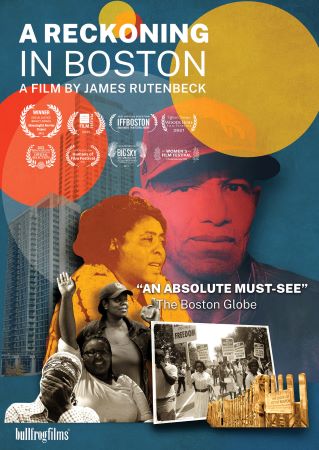
A Reckoning in Boston 2020
Distributed by Bullfrog Films, PO Box 149, Oley, PA 19547; 800-543-FROG (3764)
Produced by Carl Chandler, Kafi Dixon, and James Rutenbeck
Directed by James Rutenbeck
Streaming, 84 mins
College - General Adult
African Americans; Poverty; Race Relations
Date Entered: 08/01/2022
Reviewed by Mary Kamela, Student Support and Engagement Librarian, University at BuffaloFilmmaker James Rutenbeck initially set out to create a documentary highlighting participants’ experiences in the Clemente Course for Humanities, a free college-level course for low-income residents, in the Dorchester neighborhood of Boston. However, inspired by stories of the students, he chose to expand the documentary and follow two participants and their lives over the next five years, from 2015-2020. The result is an honest, raw depiction of the lived experience of people of color in Boston.
The film follows Kafi Dixon, a bus driver by day who has been working tirelessly to begin a women’s urban land cooperative in Boston. Viewers see her struggle repeatedly, through no fault of her own, with bureaucratical roadblocks and careless treatment by city officials. In addition to navigating this schedule, she must cope with housing insecurity and trauma from the losses and injustices that have plagued her community. Viewers also meet Carl Chandler, a single grandfather with Black and Indigenous ancestry. Chandler shares Dixon’s struggle with housing insecurity, dealing with an unexpected eviction. He thrives in the Clemente Course, bringing critical insight and the lived experience of his ancestors into discussions. He was chosen as the commencement speaker for his class, and his moving speech is included in the film.
In addition to shining a light on Dixon and Chandler’s experiences, A Reckoning in Boston also provides historical context of segregation, Civil Rights, and racism in Boston. The film includes archival footage of white Bostoners’ riots against school de-segregation as well as coverage from the Charles Stuart case, a racial hoax in which a white man’s untrue allegation that an African American assailant killed his pregnant wife led to a city-wide manhunt.
The film alternates between scenes of the Clemente Course, Dixon and Chandler’s respective lives, historical footage, and commentary from Rutenbeck. Some sections are punctuated by voiceover excerpts from Clemente course texts, including writings by Socrates and James Baldwin. The commentary from Rutenbeck provides context for filmmaking choices and takeaways from his personal journey in learning about the experience of Black people in Dorchester, a neighborhood only miles away from his affluent, white suburb. The film succeeds at bringing awareness to racial and social injustice in Boston, a Northern city that may typically be underrepresented in inequality discourse. Dixon and Chandler were each given a producer role for their appearance in the film and their input in its editing. The film is highly recommended for college students and adult viewers alike, as its message extends far beyond the classroom and into real life.
Awards: Best Feature, Morehouse College Human Rights Film Festival; Nationwide Broadcast on PBS's Independent Lens
Published and licensed under the Creative Commons Attribution 4.0 license. Anyone can use these reviews, so long as they comply with the terms of the license.